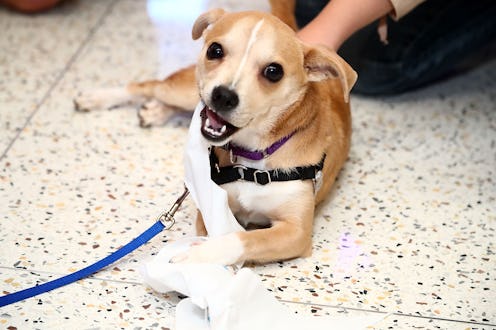Life
The Best Way To Help Your Pet’s Separation Anxiety Before They Ruin Your Living Room

Do you often come home from a long day’s work to see your dog has peed all over everything? Or maybe it keeps tearing up the couch cushions and throwing the trash everywhere? If you don’t know how to help your pet with separation anxiety, all that destruction can get out of control really fast, says the ASPCA. But first, take a deep breath. It's important to remember that this kind of destruction comes from a place of deep-seated anxiety for your pet.
"Dogs can experience separation anxiety for a number of reasons depending on their age and background," Lisa Bernier, manager of BARK for Good, BARK's social impact program, tells Bustle. "[F]or example, a young puppy that has just been separated from its litter can experience separation anxiety, as can an older dog that's come from a shelter after having been left alone too long or been abandoned. At their core, though, dogs are pack animals, meaning they innately don't like to be alone." Your pet isn’t purposely trying to make your life miserable; it’s just feeling really scared when you leave, and the only way it knows how to show you that is through destroying things and making a lot of noise.
According to The Rover, separation anxiety is more than just slight nervousness about an owner leaving; it’s a clinical term that is diagnosed by veterinary behaviorists. True separation anxiety, says The Rover, is a pet that is in a “state of panic” when it is left alone, which can result in pacing, barking, whining, destruction of household items, and even self-injury. "Dogs crave stability and routine, and being left alone can be nerve wracking when all they want is to be with their human," Bernier says. A milder form of separation anxiety is “isolation distress” in which the pet can be comfortable as long as it is with a trusted sitter, says The Rover.
Treating a dog with separation anxiety is complicated but there are many ways you can help your dog feel way more comfortable when you inevitably have to leave the house. To truly understand your pet’s level of anxiety, The Rover recommends setting up a camera in your house and to start a stopwatch as you close the door, that way you know where to begin treatment. For mild cases of separation anxiety, the Humane Society of the United States recommends not making a big deal out of your arrival or departure from the house. In other words, rather than big goodbyes and greetings with lots of petting, just ignore your dog. It’ll be hard at first because your instinct is to cuddle your floofer, but it really is the best thing for your baby because they’ll realize you coming and going isn’t a huge deal.
"The key is to be patient and get to the source of your pup's anxiety, so that you can find what works best for you and your dog specifically — knowing the difference between boredom, separation anxiety, and general stress is a critical first step," Bernier says.
The Humane Society also recommends leaving your dog with recently worn clothes that smell like you and, under the guidance of your vet, an over-the-counter calming product that reduces the fear in dogs. The ASPCA says you can also try counterconditioning, which means creating a positive association between being alone and something they like. To countercondition your dog, says the ASPCA, give your dog a treat that will take them 20 to 30 minutes to eat, like a toy stuffed with cheese spray, before you leave, and only give your dog this treat any time you leave so your dog associates this extra special treat with being alone.
Other methods of helping your dog with their separation anxiety include distraction. "I personally really like the "go find it" trick," Bernier says. "Right before you leave, throw a handful of training treats or kibble bits into a room away from the door, so they land scattered around the floor or bed. Your dog will go on a hunt to find the food and, when done, they'll likely have forgotten that you even left."
It's best to work with a trained veterinary behaviorist for more severe cases of separation anxiety. But with love, patience, and guided interventions, your best friend will find some relief from their anxiety.